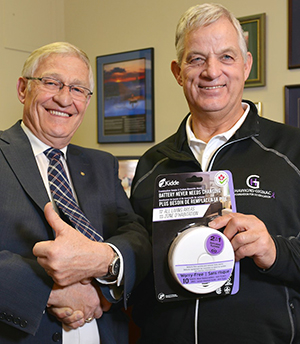‘Perfect time’ for CO law to come into effect: advocate

John Gignac says the Hawkins-Gignac Act, a law implemented in October that requires Ontario homeowners to install carbon monoxide detectors, has come into effect at an opportune time.
“It’s the perfect time of year to buy a detector — as a Christmas gift,” the campaigner for CO awareness says. “It’s the most important gift to give anyone.”
In December 2008, his niece, OPP constable Laurie Hawkins, and her family died from CO poisoning while they slept in their Woodstock home. The tragedy prompted Gignac, a retired firefighter, to begin a campaign to both educate the public about the dangers of poisoning by the odourless, tasteless and colourless gas, and make CO detectors mandatory in Ontario homes.
When Bill 77 passed into law, homeowners became required to have at least one working CO detector in their homes by April 15, 2015. Failure to comply carries a $235 fine.
Personnel at Deer Park Home Hardware, at Yonge and St. Clair, and at Dickson Home Hardware, at 2030 Avenue Rd., say sales of CO detectors have been on the rise at their stores since the legislation passed. Neither provided exact figures.
Robert Rumolo, manager at Dickson Home Hardware, said he noticed an increase in sales before the law took effect, ascribing it to “rumours” about new legislation coming down.
“There were a lot of rumours about it, and that drove a lot of customers into our store, asking questions and then buying units,” Rumolo said. “We also received a lot of phone calls from people wanting to know what their options were and what type of units they could buy.
“After the legislation passed, kaboom! There has been a strong response and sales have definitely increased.”
He added that his staff has been updated on the law “so they can help our customers.”
Other midtown hardware stores declined an invitation to comment about sales or to offer advice about compliance readiness for homeowners.
“For homeowners to be compliant, there’s not a whole lot they have to do,” Rumolo said. “They just have to purchase the unit and plug it in.
“Units feature a yellow tab that, when pulled, activates both the unit and the battery backup. That’s it. Some run completely on batteries and don’t even have to be plugged in.”
Gignac agrees, saying compliance should not be a troublesome ordeal for the everyday consumer.
“The impact is not as bad as everyone thinks,” he said. “Five and a half years ago, I had trouble finding a CO detector for less than $90 (and) now they can be had for as little as $20.”
Some even feature a sealed battery, good for the entire life of the unit, but a CO detector is not a one-time purchase. Even hard-wired detectors have a shelf life, of about 10 years.
Raising awareness that they don’t last forever is important to Gignac’s organization, the Hawkins-Gignac Foundation for CO Education, whose online presence at EndTheSilence.ca serves as a public resource. And since purchasing a detector can be a financial problem, his foundation has set up a fundraiser to assist in getting units to families in need.
Carol Heller, a home safety expert with Vaughan-based fire safety company Kidde Canada, a national distributor of CO detectors, advises that attention to where it’s installed is critical.
The basement is not the right spot.
“Deadly carbon monoxide gas mixes freely with air throughout the entire home and people tend to be most vulnerable when they are asleep, so it’s vital that CO alarms are installed near all sleeping areas,” Heller says.
